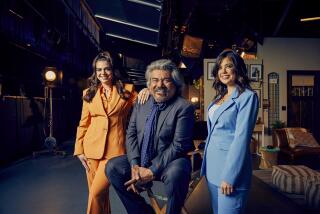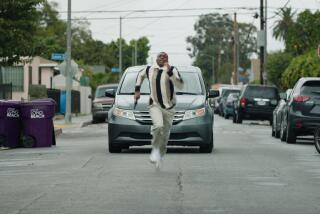Q&A: Louie Anderson channels his mother for ‘Baskets’ role
Louie Anderson, the comic and author, is right now delivering one of the year’s great performances on “Baskets,” a melancholy FX comedy about a bitter man in search of beauty. That is Chip Baskets, played by series co-creator Zach Galifianakis, whose training in French artistic clowning has taken him no further than a rodeo in Bakersfield. Anderson, 62, plays his mother, Christine.
Although he is a man playing a woman, there is no gimmickry or irony in Anderson’s portrayal. Christine is Chip’s critic and protector; her disappointment in him is just the flip side of her hopes for him. Though a lazier show might make her a monster, in “Baskets” she is flawed but human and at times heroic.
Anderson, who grew up poor in St. Paul, Minn. — one of 11 children of an “alcoholic” father and an “optimistic” mother — puts both light and dark into the part. His unlikely and, as it turned out, perfect casting began when Galifianakis described Christine’s voice to Louis C.K. and director Jonathan Krisel, the series’ co-creators. “You mean like Louie Anderson?” C.K. asked, as Anderson tells it. “Shall we give him a call?”
“I’m pretty sure my mom orchestrated it from the great beyond,” Anderson said recently, “‘cause I mean how would that come up otherwise? She always could have been a star herself, so she’s finally getting a chance to act.”
In “Baskets” Christine is protective of Chip, but she also gives him a hard time.
Anderson: The thing that people love to do that always amazed me, that always bothered me, is they love to scold their children in front of strangers. And so I make sure Christine does it. I’ve never said anything mean to Chip when I’m alone with him, it’s always when someone else is there. That’s a really big Midwestern thing.
I’m maternal as a person, I’m helpful. I learned it from my mom: “Be nice to people, you never know what kind of day they had.” Big insight. I didn’t get it as a belligerent teenager: “Wha? You’re crazy.” But I heard every word.
You say your mother could have been a star.
She was a big personality; funny, a lot of grace.
So even with an alcoholic husband and a lot of kids …
... she was able to be herself to some degree, to maintain that person she was. She was a lovely person; people loved being around her; she always had positive things to say. She was an elegant person. She loved soft clothes, colors — when I picked the clothes for Christine, I tried to pick all stuff my mom or sisters would wear. Even though we were dirt poor, she always looked nice.
You grew up in St. Paul.
In the Roosevelt Projects. The difference between projects in St. Paul and [elsewhere] is that we had real lawns; people took care of their lawns.
Was it a dangerous neighborhood or just a poor one?
Well, if it was, we were the danger. Nobody would come in there. Kids wouldn’t come that way. People automatically assume that if it’s the projects, nobody’s any good in it. I mean, you don’t think, “Hey, let’s find a really good person. Why don’t we go over to the projects?” If your car broke down on Maryland Avenue where the projects were, would you go to the right where the projects are and knock on a door, or would you go to the left where the nice apartments are?
Did it affect whom you could be friends with?
As soon as your friend’s parents found out you were from the projects the kid either became your friend anyway, because the parents were not prejudiced or worried, or you weren’t friends anymore — “My mom said I can’t hang out with ya.” And then when you line up and they say, “Project kids on this wall and the other kids on this wall,” that gives you a really definite idea.
How about your siblings — did any of them turn to the arts?
I think they’re all artistic, but when you live in an alcoholic household, there’s dynamite wired up, and you’re waiting for it to go off. Whether it goes off or not doesn’t really do the damage, it’s the waiting — so to concentrate on anything, is … you know. My dad was a violent drunk.
I always wanted to be something. President for a long time. ’Cause it seemed like a powerful job, and I didn’t have any power growing up in my family. You’re powerless around an alcoholic — they minimize everybody.
What made it possible for you to concentrate?
Timing. My era. Therapy was popular. There were school social workers, there were books on alcoholism, there were meetings galore. I had friends who said, “Hey. it’s not the end of the world.” I grew up in a time where there were resources. Minnesota is a leading resource of chemical dependency [treatment]. Hazelden, the Johnson Institute — these are breakthrough people in that. I think that was it. I did lots of therapy.
Your father quit drinking at 69. What stopped it?
I don’t know. I think he got a DUI. It must have been a little more than that. Maybe not. He lived seven years after that.
Did it change your relationship?
He was meaner: dry drunks. But you know I always loved my dad, and there was a lovable part of him. ‘Cause he was an artist himself. He was a great musician with Hoagy Carmichael, in the early 1900s. I had heard all the stories, but he had false teeth by the time I was born and no longer played the trumpet; he had a mouthpiece he used to blow into, and he had a ukulele he used to play and a harmonica. Andy Anderson. Although his name was Louie, we called him Andy. I didn’t know I was named after him till I was six or seven years old.
When did you go from wanting to be president to be a performer?
1978. I did it on a dare, comedy. I said these guys aren’t funny and someone said, “Why don’t you try it?” I said, “I will.” I signed up next week, my mom and dad came down, my family came down, my coworkers. And I did three minutes, and I felt like I did good.
Can you remember your routine?
“I can’t stay long, I’m in between meals,” which got a big laugh. Fat jokes. They were good jokes; they still get laughs. “Let me move the microphone so you can see me.” “I was the first kid on the block voted most likely to become a group.”
So your first jokes were all about your size?
Stuff about my family I stumbled upon doing crowd work. I said to a guy [in the audience], “Is that your dad?” He goes, “Yeah.” I go, “He seems nice.” He goes, “Yeah.” “You got a good relationship?” “Yeah.” I said, “My dad never hit us, he just carried a gun; he never shot us, he’d just go [makes the sound of a cocking gun].” And I could tell that that was brand-new, I could sense that “Uh-oh.” It was like opening a room and finding treasure in there.
Do you like your material to feel a little uncomfortable?
Well, you know, I came to a fork in the road — am I going to be this surly guy I really am or am I going to be this guy that really is sweet, like my mom, am I going to be that guy onstage? Am I going to demean people or encourage people? Am I going to be the butt of the [joke] or tell them I think they’re idiots? I tried both gloves and one fit better; I’m much better as a nice guy. I probably would have been just as good if I went the other way, but certainly it would have been much, much darker. I’m at that crossroads right now. I have a great following, but I’m doing something brand-new and this might be the opportunity to, you know, open the trunk.
Have you tried out that darker Louie onstage?
I’ve done some jokes like, “I read where a guy killed his family today; people are always surprised by that. I always think, why doesn’t it happen more often? I don’t think it starts out where you’re going to kill everybody, but the rush of the first one must carry you right through.” And that is a very dark joke. But that’s the kind of humor that I feel a kinship to.
And now, do you keep up with younger comics?
I try not to watch comics; you have to be careful if you watch too much comedy ‘cause it’ll seep into your act. But I always watch if I’m at the Comedy Store, and I always give notes. I say to every comic out there, “Don’t do anything that doesn’t mean something to you, don’t waste your time; there’s nothing you can get looking outward compared to the stuff that you have inward.” I was always doing it, luckily, I just kept mining that same deep mine — and then sometimes I’d find a side mine I didn’t even know I had. I’m working on a couple of new writing things; I want to develop a one-hour drama, and I want to develop another animated show, and I’d like to play my dad like I play my mom; I’d like to play that mean character who has a big heart; that person who’s caught in the middle. I’d like to have a chance to play that.
Do you feel your dad is inside you too?
Oh, my God! I work very hard at not being mean to people. I mean, I’m an egomaniacal comic, full of myself, you know. But my mom, thank God, has a bit in my mouth and a bridle.
You sound so natural in the show; are you doing much improvisation?
Well, Jonathan’s so generous, I say to him, “Do you mind if I try it like my mom would say it?” “Yeah, do it.” I was terrified I had to learn all that dialogue. And he goes, “Don’t worry about that” — ‘cause I was honest with him — “we’ll take it slow.” I never knew how to act early on — I thought I had to “portray” something. But I’m not portraying anything, I’m just being that character, as authentically as possible.
Do you think Christine is from Bakersfield, or did she somehow wind up there?
From USA. From Middle America, USA. But Middle America could be on the East or West Coast. Big-box store America, don’t you think? I think that swatch through the country is socioeconomic, and everybody’s in it whether they’re in Jersey, Bakersfield or Sheboygan. And you know I was in my element in the kitchen. Midwesterners and poor people — the kitchen’s it. You talk there, you live there, you eat there, you fight there; it’s all done in the kitchen.
Follow Robert Lloyd on Twitter @LATimesTVLloyd
More to Read
The complete guide to home viewing
Get Screen Gab for everything about the TV shows and streaming movies everyone’s talking about.
You may occasionally receive promotional content from the Los Angeles Times.







